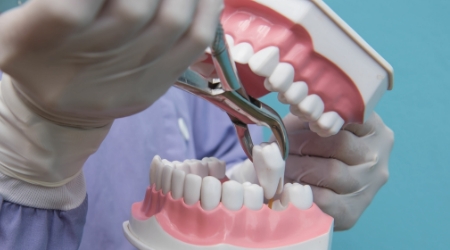Tooth Extractions Eugene
Gentle Tooth Removal
We never take the extraction of a tooth lightly. When possible, we encourage our patients to take steps to save their natural teeth. With that being said, it must still be acknowledged that in some cases, tooth removal is the best option. If you ever need a tooth extraction in Eugene, you can depend on Dr. Paskalev and our team to handle your case with the goal of making your treatment experience as positive and easy as possible.
Why Choose College Hill Dental for Tooth Extractions?
- Able to Perform Both Surgical and Non-Surgical Extractions
- Patient Comfort Is a Top Priority
- State-of-the-Art Tooth Replacement Available
Reasons Why Tooth Extractions Are Necessary

We may recommend the extraction of one or more teeth due to the following issues:
- Malocclusion: At times, it may be necessary to remove a tooth in order to address orthodontic problems. Known in dentistry as a malocclusion, a bad bite can be problematic for a patient, causing conditions such as TMJ dysfunction, bruxism, or cosmetic problems.
- Extra teeth: Extra teeth can cause crowding in the mouth, which can affect your bite and oral hygiene. One or more extractions can be helpful in such cases.
- Impacted teeth: An impacted tooth is a tooth that cannot fully emerge from the gum tissue. Impacted teeth are at a significantly greater risk of developing infections and other complications. Wisdom teeth are often removed because they are impacted.
- Decayed or damaged teeth: Teeth that are severely decayed or damaged may not be reparable. In such cases, removing them is the best option.
The Process of Removing a Tooth

The process of removing a tooth can be categorized as being non-surgical or surgical. Though we will discuss treatment with you before beginning, at times, we may begin a non-surgical extraction that quickly turns into a surgical extraction.
A non-surgical extraction can be completed on a tooth that is fully extended and intact. We begin with an elevator, which is used to pull up and lift the tooth from the socket. Then, we pull the tooth out with forceps. We make sure to provide local anesthetic to make this process as comfortable as possible.
Surgical extraction means that it is necessary to make incisions to retrieve a tooth from its socket. This is often done for teeth that are impacted, including wisdom teeth, also known as third molars. For some patients, it may be necessary to break, or quarter, the tooth and then remove it in sections. Again, we try to make this process as comfortable as possible.
Tooth Extraction Aftercare

Before you leave our office, we will provide you with instructions to facilitate a smooth and complication-free recovery. We may advise you to:
- Take prescribed medications as directed.
- Keep the extraction site clean to speed up healing. Be gentle when performing oral hygiene so you do not irritate sore tissues.
- After 24 hours, regularly rinse your mouth with salt water (8 oz warm water with half a teaspoon of salt).
- Avoid smoking and drinking through a straw.
- Prop your head up with pillows while sleeping.
- Get plenty of rest.
- Consider the long-term benefits of replacing the missing teeth. We may recommend that you get a dental implant or bridge to fill in the gap.
Understanding the Cost of Tooth Extractions

The cost of tooth extractions depends on a few factors. Generally speaking, this service is affordable for most patients. During your consultation, we can share some specific numbers and help you understand your payment options. For example, we welcome dental insurance, offer financing through third-party companies, and even have an in-house savings plan. Feel free to ask us any questions; we want to make the financial aspect of your care as stress-free as possible.
Factors That Can Affect Tooth Extraction Cost
Some factors that may affect the cost of your tooth extraction procedure include:
- The specific tooth being extracted: The location and type of tooth that needs to be removed can significantly impact the cost. For example, extracting a front tooth is often less complicated and less expensive than extracting a molar or wisdom tooth.
- The number of teeth being extracted: If multiple teeth need to be removed, the overall cost will increase.
- The overall complexity of the case: Simple extractions are generally less expensive than surgical extractions, which may be necessary if the tooth is impacted (stuck beneath the gumline) or broken. Additionally, while we can perform most extractions in our office, we sometimes need to refer patients to a specialist. Obviously, their pricing structure may differ from ours.
- Additional procedures required: After your tooth is extracted, you may need to get it replaced in order to avoid future oral health complications. We offer different types of tooth replacement at varying price points.
Does Dental Insurance Cover Tooth Extractions?
Yes, it is very common for dental insurance to cover tooth extractions. Simple extractions are often classified as a minor procedure, so around 80% of their cost may be covered. Surgical extractions may be around 50% covered. Our team welcomes insurance, and we are in-network with several popular plans. We will be happy to help you understand how your benefits apply and file timely claims on your behalf.
Other Options for Making Tooth Extractions Affordable
Outside of insurance, other provisions that can make tooth extractions more affordable include:
- Our practice accepts third-party financing through Cherry and CareCredit. The application process is easy, and most patients receive fast approval for a payment plan that works within their budget.
- Membership plan. In exchange for a reasonable annual fee, you can receive all preventive care and a 15% discount on additional services, including tooth extractions. Signing up for our membership plan is simple, and you can start using your benefits right away.
Are you interested in learning more about tooth extractions and their cost? We invite you to contact our practice today.
Tooth Extractions FAQs
Does It Hurt to Get a Tooth Extracted?
Many patients are hesitant to commit to needed dental treatment because they are worried that it will be painful. The good news is that whether you are having a single tooth pulled or multiple, the first step is always numbing your mouth with a local anesthetic. This way, you shouldn’t feel a thing during your procedure. Afterward, some soreness is to be expected, but this can be managed by the pain relievers recommended by your dentist. By closely following your aftercare instructions, you can prevent infection and promote healing. If you are feeling significant discomfort or showing signs of infections, give us a call so we can help!
Can I Leave the Space Empty After a Tooth Extraction?
If the tooth that is being pulled is in the back of the mouth, you may think that replacing the tooth is unnecessary. After all – no one can see it! The truth is that even a single missing back tooth can make it difficult to chew properly and enunciate clearly. This can mean poor nutrition and indigestion. That’s why it is usually recommended that you schedule an appointment with your dentist to discuss tooth replacement options once the extraction site has healed.
How Should I Prepare for My Tooth Extraction?
Preparing for your tooth extraction is just as important as following your aftercare instructions. Before your procedure, make sure to be open with your dentist about the questions that you have. This includes what to bring with you and what you should eat the morning of. They will let you know if/when you need to pick up any prescriptions and if you need to arrange for a trusted friend or family member to drive you home after your procedure.
What Risks Are Involved with Tooth Extractions?
Tooth extractions are considered to be extremely safe. However, with any dental procedure comes risks. With tooth extractions, the primary risk is infection. If it isn’t addressed quickly, it can spread to other areas, becoming problematic. Another risk is dry socket. This condition is painful and delays the recovery process. Before your procedure, your dentist will provide you with an extensive list of aftercare instructions to reduce these risks. They will also give you a list of signs and symptoms to look out for so you know if you need to reach out to them.





